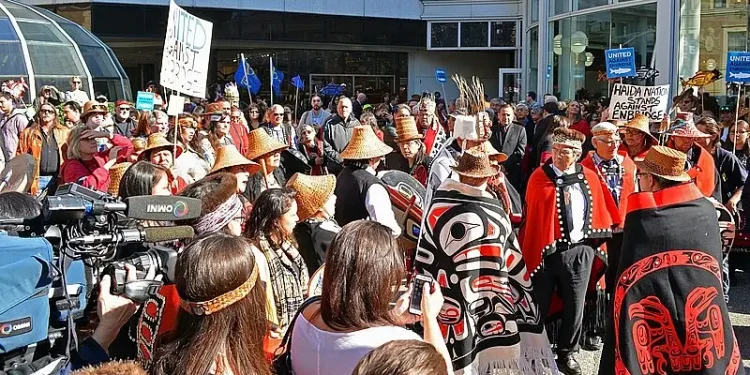A historic step toward reconciliation unfolded as the Haida Nation and the Canadian government signed the Chiix̲uujin / Chaaw K̲aawgaa “Big Tide (Low Water)” Haida Title Lands Agreement. This agreement formally recognizes Haida Aboriginal title to lands on Haida Gwaii, a significant acknowledgment of Indigenous sovereignty.
The deal, signed on December 4, 2024, solidifies a new era of governance while ensuring stability for all island residents.
A Historic First in Indigenous Land Rights
For the first time in Canadian history, the federal government has formally recognized Aboriginal title over a specific territory without a court ruling.
The Haida Nation has long asserted its inherent rights over Haida Gwaii, a stunning archipelago off British Columbia’s northern coast. This agreement is the culmination of decades of advocacy, negotiations, and nation-to-nation dialogue.
Details of the Agreement
- Recognition of Haida Title: Canada acknowledges Haida governance over the lands of Haida Gwaii, including the foreshore up to the low-water mark.
- Cooperative Management: The Haida-Canada Archipelago Management Board will oversee Gwaii Haanas National Park Reserve during the transition period.
- Legal and Administrative Stability: The agreement ensures continuity of federal services and does not affect private property or local governments.
- Five-Year Transition Period: Both parties will work collaboratively to align governance frameworks while maintaining economic and environmental stability.
The Path to Recognition
A Legacy of Advocacy
The Haida Nation’s struggle for recognition dates back more than a century, with formal efforts gaining momentum in the 1970s. A pivotal moment came in 2021 when Canada, British Columbia, and the Haida Nation signed the GayG̲ahlda / Kwah.hlahl.dáyaa “Changing Tide” Framework for Reconciliation, setting the stage for structured negotiations.
This new agreement builds on the Nang K̲’uula / Nang K̲’úulaas Recognition Agreement (2023) and the Gaayhllxid / Gíihlagalgang “Rising Tide” Haida Title Lands Agreement (April 2024) with British Columbia. Together, these agreements form a comprehensive framework for Haida sovereignty.
Voices of Leadership
Gaagwiis Jason Alsop, President of the Haida Nation:
“This recognition acknowledges historic injustices and illustrates what is possible when we work together. We can now enter a new era of peaceful co-existence, ensuring Haida Gwaii’s well-being for generations.”
Prime Minister Justin Trudeau:
“This landmark agreement reflects our commitment to reconciliation. It is a testament to the Haida Nation’s leadership and determination.”
Implications for Haida Gwaii
This agreement represents more than just a legal milestone; it is a fundamental shift in governance and Indigenous rights. The Haida Nation now has the recognized authority to manage its lands according to its traditions and values.
What This Means for Residents and Stakeholders
- For Haida Citizens: Greater self-governance and the ability to shape policies affecting their lands.
- For Non-Indigenous Residents: Continued stability with no disruption to private property or municipal services.
- For Environmental Conservation: Strengthened stewardship over Haida Gwaii’s rich biodiversity and cultural heritage.
A Five-Year Transition
Over the next five years, the Haida Nation and Canada will work to harmonize laws and governance structures. This gradual implementation ensures a smooth transition while upholding the interests of all residents and stakeholders.
| Transition Period | Actions |
|---|---|
| Year 1 | Establish governance framework and oversight committees |
| Year 2 | Align land management policies with Haida laws |
| Year 3 | Integrate conservation efforts with federal programs |
| Year 4 | Review and refine cooperative governance agreements |
| Year 5 | Full transition to Haida Nation-led governance |
In Conclusion
The Chiix̲uujin / Chaaw K̲aawgaa “Big Tide (Low Water)” Haida Title Lands Agreement is a landmark moment in Canada’s reconciliation journey. It acknowledges the Haida Nation’s sovereignty and sets a precedent for future Indigenous land agreements.
As the transition unfolds, this partnership serves as a powerful example of how collaboration can foster justice, stability, and mutual respect.
With this historic step, the Haida Nation reclaims its rightful place as stewards of Haida Gwaii, ensuring the preservation of its lands, culture, and governance for generations to come.
Sources: Canadian Prime Minister.








